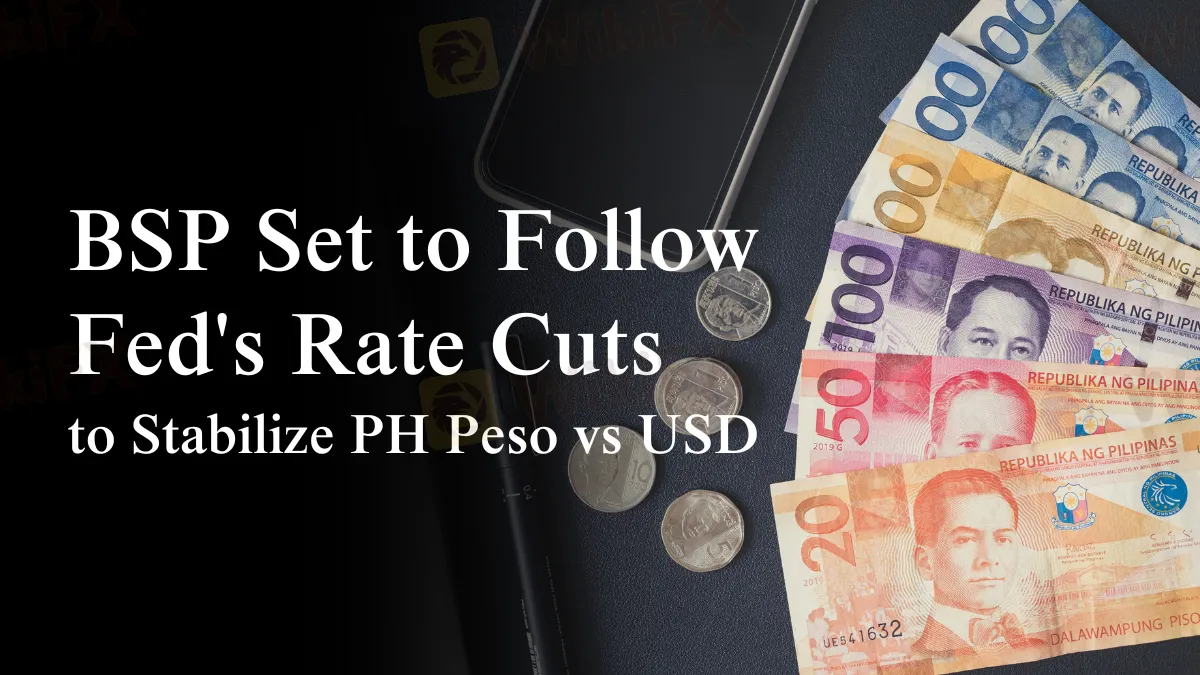简体中文
繁體中文
English
Pусский
日本語
ภาษาไทย
Tiếng Việt
Bahasa Indonesia
Español
हिन्दी
Filippiiniläinen
Français
Deutsch
Português
Türkçe
한국어
العربية
BSP Set to Follow Fed's Rate Cuts to Stabilize PH Peso vs USD
Abstract:Philippines Central Bank (BSP) is set to follow the Fed's rate cuts to stabilize the PH Peso over USD, maintaining a favorable interest rate spread and supporting the economy.

The Bangko Sentral ng Pilipinas (BSP) is expected to closely mirror the actions of the US Federal Reserve in an effort to maintain a favorable interest rate differential, according to a recent analysis by the highly respected Moody's Analytics. This action aims to stabilize the Philippine peso versus the US dollar, particularly because another rate decrease is expected in the fourth quarter of this year.
Moody's Analytics analyst Sarah Tan emphasized the significance of the BSP's monetary policy coinciding with that of the US Federal Reserve. As the Fed eases its economic strategy, the BSP is expected to follow suit in order to keep the two nations' interest rate differential intact. This method is critical to preserving the peso's stability versus the dollar, a significant worry for the Philippine economy.
“The BSP would undoubtedly keep a watch on the amount of the US Fed's rate decreases,” Tan told The Manila Times.“ ”We expect the BSP to follow the Fed's path rather closely, as this will help to maintain interest rate spreads and, in turn, stabilize the peso versus the dollar.

The US Federal Reserve, headed by Chairman Jerome Powell, has indicated that interest rates may decrease as early as this month. Powell highlighted that the pace and timing of any reduction will be determined by a variety of variables, including incoming economic data and the developing outlook. Most analysts anticipate a 50-basis-point rate drop by the Fed this year, which might weaken the US currency.
In the Philippines, BSP Governor Eli Remolona Jr. has already stated that another rate decrease is possible in 2024, most likely in the fourth quarter. The BSP's Monetary Board is slated to convene twice before the end of the year, on October 17 and December 19, to consider more easing measures.
Tan also said that loosening monetary policy would bolster the domestic economy. Lower interest rates are predicted to stimulate consumer spending by reducing budget restrictions, as well as encourage private investment by lowering borrowing costs. These policies are expected to encourage economic development while acting as a buffer against external shocks, encouraging confidence in the economy's resilience.
Since adopting an inflation-targeting framework in 2002, the BSP has taken a cautious approach to monetary policy. This policy, which the BSP has constantly followed, has been key to its attempts to manage inflation and stabilize the currency, assuring the peso's resilience in the face of global economic swings.
Stay updated on the latest forex news and BSP's monetary strategies—visit WikiFX for expert insights on the Philippine peso's stability against the US dollar.

Disclaimer:
The views in this article only represent the author's personal views, and do not constitute investment advice on this platform. This platform does not guarantee the accuracy, completeness and timeliness of the information in the article, and will not be liable for any loss caused by the use of or reliance on the information in the article.
Read more

The Funded Trader: Reactivates Accounts with Revised Payout Structure
Proprietary trading firm The Funded Trader has detailed its financial recovery efforts following a turbulent period marked by an unsustainable payout model. Addressing these challenges publicly, the firm outlined the steps being taken to resolve outstanding obligations and ensure operational sustainability.

Doo Group Broadens Global Footprint with Indonesian Broker Acquisition
Doo Group has announced its acquisition of PT Prima Tangguharta Futures, a Jakarta-based broker specialising in online derivatives trading. This move represents a significant step in Doo Group's regional expansion strategy and reinforces its growing presence in Southeast Asia.

Google Warns of New Deepfake Scams and Crypto Fraud
Google exposes deepfake scams, crypto fraud, and app cloning trends. Learn how to spot these threats and safeguard your data with expert tips and advice.

Why Is UK Inflation Rising Again Despite Recent Lows?
October inflation rises to 2.3%, driven by energy costs. Renters face 8% annual hikes, while house price inflation climbs. Interest rates stay elevated.
WikiFX Broker
Latest News
GCash, Government to Launch GBonds for Easy Investments
eToro Expands Nationwide Access with New York Launch
Webull Partners with Coinbase to Offer Crypto Futures
Why Is UK Inflation Rising Again Despite Recent Lows?
Interactive Brokers Launches Tax-Friendly PEA Accounts in France
Find Regulated Brokers from A to Z on WikiFX
Google Warns of New Deepfake Scams and Crypto Fraud
Countdown to WikiEXPO Dubai 2024 — “Seeing Diversity, Trading Safely”
Former Director Sentenced for Share Disclosure Breach
PayPal Expands PYUSD Use for Seamless Cross-Border Transfers
Currency Calculator


